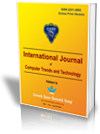An E-Commerce application for Presuming Missing Items
 | International Journal of Computer Trends and Technology (IJCTT) |  |
| © - August Issue 2013 by IJCTT Journal | ||
| Volume-4 Issue-8 | ||
| Year of Publication : 2013 | ||
| Authors :Kollipara Anuradha, K. Anand Kumar |

Kollipara Anuradha, K. Anand Kumar "An E-Commerce application for Presuming Missing Items"International Journal of Computer Trends and Technology (IJCTT),V4(8):2636-2640 August Issue 2013 .ISSN 2231-2803.www.ijcttjournal.org. Published by Seventh Sense Research Group.
Abstract:- Data mining is an interdisciplinary subfield of computer science and it is the computational process of discovering patterns in large data sets. The overall goal of the data mining process is to extract information from a dataset and transform it into an understandable structure for further use. Presuming is a technique to assume a future behavior depending on their past behavior. Presuming is a very integral and vital part of Data mining. In E-Commerce application, there are mainly three important parts, first Business Owner, second customer and third Items. Owner earns profit by selling items to customer. It is well known fact from Market-Basket Analysis of Data Mining that Items having associability with each other, and that can be found by mining information from customer buyed products. This analysis helps in finding the item associability. Here we are going to propose a analysis by using which we effectively and easily get the item association and can make the prediction for item which is missing in that transaction. For this we are using Association rule and Apriori Algorithm, in order to reduce the rule mining cost, this algorithm is generating frequent item sets from the transactions which are already done. This algorithm uses Boolean vector with relational AND operation to discover frequent item sets and generate the association rule.
References-
[1] R. Agrawal and R. Spirant, “Fast Algorithms for Mining Association Rules,” Proc. Intel Conf.Very Large Databases(VLDB ?94), pp.487-499, 1994.
[2]K.K.R.G.K. Hewawasam, K. Premaratne, and M.-L. Shyu, “Rule Mining and Classification in a Situation Assessment Application: A Belief Theoretic Approach for Handling
[3]Data Imperfections,” IEEE Trans. Systems, Man, Cybernetics, B, vol. 37, no. 6 pp. 1446-1459, Dec. 2007. Appriori Algorithm Reference
[4]P. Bollmann-Sdorra, A. Hafez, and V.V. Raghavan, “A Theoretical Framework for Association Mining Based on the Boolean Retrieval Model,” Data Warehousing and Knowledge Discovery.
[5]Kansu Wickramaratna, Miroslav Kubat and Kamal Premaratne, “Predicting Missing Items in Shopping Carts”, IEEE Trans.
Keywords : — Association Rule Mining, Presuming, Data mining, association.
